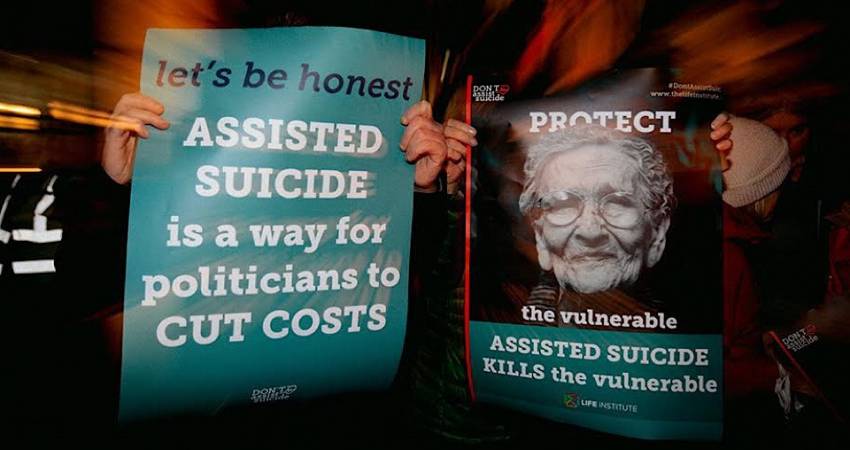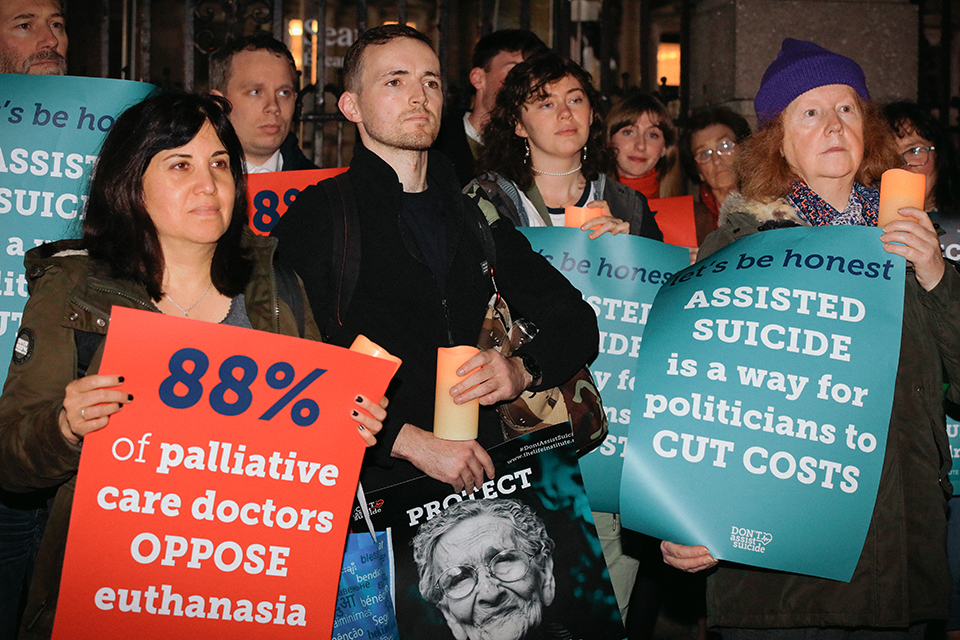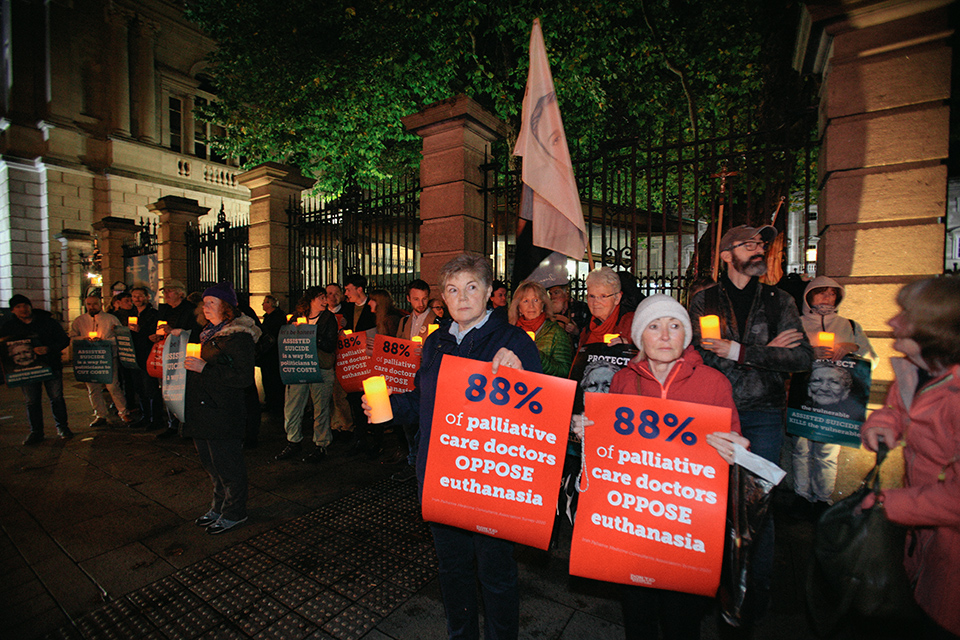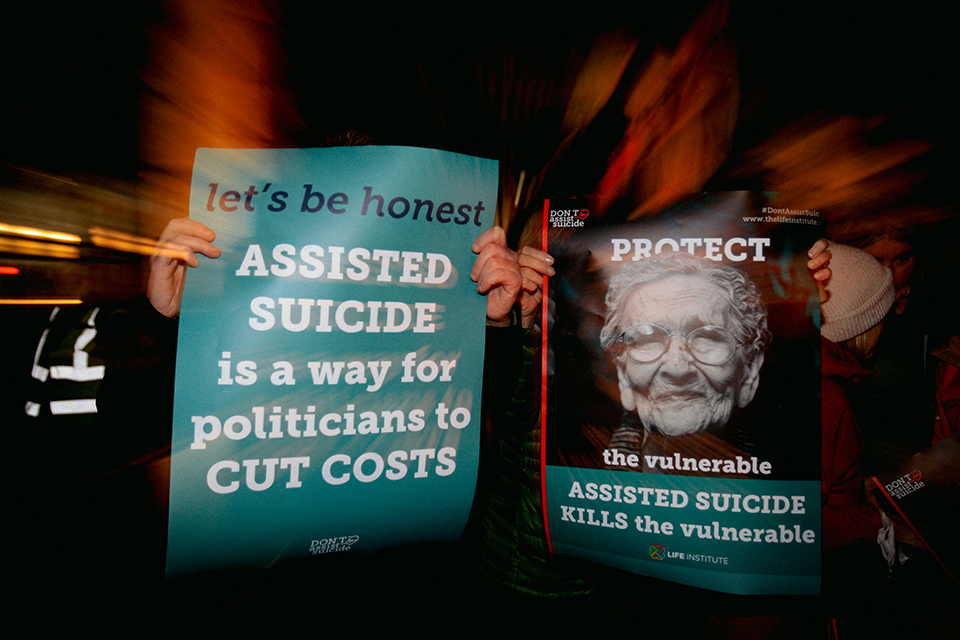
"Don't Assist Suicide" protest at Dáil hears as TDs debate changing law
A demonstration at Dáil Éireann opposing the introduction of assisted suicide heard that its legislation would "endanger the elderly, the sick and the most vulnerable", and urged TDs not to ignore the "devastating" evidence emerging from Canada where the number dying by assisted suicide has "increased twelvefold."
The vigil, organised by Life Institute, took place as a Joint Oireachtas Committee report on the issue was being debated in Leinster House, with some TDs speaking strongly against legalisation while others favoured it.

The Dáil could vote to approve the report recommending assisted suicide next week, with Fianna Fáil leader Micheál Martin confirming that party members will have a free vote on the proposed legislation.
Martin told the Dáil that he had decided “it will be a vote of conscience for every individual of the Fianna Fáil party” ahead of a vote next Wednesday. Mr Martin said he had “very serious reservations” about the proposed legislation, party members would receive a free vote on the issue.
“In the Fianna Fáil Party, for close to a decade now, we have had a free vote on issues to do with life or an issue of conscience. That will remain the position in respect of this proposed legislation,” he said.
Those attending Thursday night's protest held placards saying "Don't Assist Suicide" and pointing to a survey by the Irish Palliative Medical Consultants Association which found that 88% of that group of medical experts were opposed to assisted suicide.
Sandra Parda of Life Institute said that TDs must listen to doctors and other medical experts, including palliative care experts who gave evidence before the Oireachtas.
“Irish medical bodies are almost uniformly against euthanasia and assisted suicide,” Ms Parda said. “We have seen consistent opposition to attempts to change the law from most of the bodies representing the medical profession in Ireland.”
This opposition, she said, was reiterated after the publication of the recommendations of the Joint Oireachtas Committee on Assisted Dying, with medical bodies underlining how changing the law would be harmful and contravenes sound medical practice.
“The Irish Association of Palliative Care, the Irish Palliative Care Consultants’ Association, the Royal College of Physicians and the College of Psychiatrists of Ireland all pushed back against the recommendations, saying they do not support any change in the law to legalise euthanasia or Physician-Assisted Suicide,” Ms Parda added.
“We have heard much talk from our politicians who support changing the law about assisted suicide and euthanasia acting as a potential solution to painful death. However, there is a consensus among medical bodies that palliative care should not involve any action or treatment designed to deliberately bring about a patients death. We must listen to these experts, because they are clear that the alleviation of pain, as promised by many advocates of euthanasia, is a false premise, and that assisted suicide is contrary to medical practise.”
Ms Parda also said that it would be a "dereliction of duty" for Irish TDs not to listen to the weight of evidence from Canada, where MAiD (Medical Assistance in Dying) deaths have risen twelve-fold since 2017.
"The Canadian numbers are startling. The evidence is piling up that euthanasia is transforming Canadian society for the worst. It is now the fifth-leading cause of death in Canada. We know that MAiD assessors and providers are increasingly failing to approach it as a last option, with the percentage of requests that are denied continuing to fall. Preliminary data shows the severity of the situation, with more than 15,000 people lethally injected last year alone."
“The reality in Ireland is that bringing in assisted suicide will save the government and our embattled health service money. Assisted suicide and euthanasia as a cost-cutting measure is something which has been evidenced elsewhere, including in Belgium, where reported euthanasia cases have more than doubled in ten years," the Life Institute spokeswoman added.
“The president of a Belgian health insurance company recently backed euthanasia for the elderly to save money, claiming that extending the country’s euthanasia laws to include those who are “tired of life” would avert a social funding crisis.”
The Life Institute say that they will be ramping up their campaign against assisted suicide and euthanasia in the public square, coinciding with a similar debate, taking place in Britain, after an assisted dying law was introduced in the House of Commons earlier this week.

Raymond Keogh, who was amongst those in attendance, said that he was taking part for his wife Maria, who has dementia, and had written to every TD to share her story and to urge them "not to regulate her to a class of unwanted."
In Mr Keogh's open letter addressed to Taoiseach Simon Harris, he says that the concept of euthanasia "fills me with horror."
"Dementia is a terrible disease that affects thinking, memory, reasoning, personality, mood and behaviour. My wife, Maria has the illness. It has affected our lives completely and caused financial problems. We have lost our freedom. It impacts the entire family. I could go on and on."
Mr Keogh says his wife is now confined to a nursing home, and has lost the ability to use words, be it her native Spanish or her adopted English. He says he does not, however, see his wife as a burden, writing:
"I see her as the girl I met and married almost 50 years ago in El Salvador, Central America. I ignore the problem and break into her world with as much fun, humour, and excitement as I can muster. And she responds positively."

Her response includes eye contact, a glorious smile. Sometimes she reaches out to me with her hands, taking mine in hers. She responds to humour. Despite her condition, we have grown closer. I would even say we have fallen in love anew."
Mr Keogh continued: "The concept of euthanasia fills me with horror. Maybe you say that it is necessary for some and it will be strictly controlled. What is sometimes called the Easement Rule shows otherwise. The Rule affirms that underlying moral standards are always interpreted in progressively less rigorous ways over time. She will eventually be regarded a s a social burden to be discarded."
"There is no compassion in this," he urged TDs, adding: "As someone who is enduring a very difficult situation, I make the plea. Please do not relegate Maria to the class of unwanted by your vote in Dail Eireann."
Other demonstrations supporting the campaign to oppose legislation allowing for assisted suicide were also held in Cork and in Leitrim, where demonstrators held placards saying 'Kill the bill, not the ill' and calling on TDs to oppose the report.
Maria Maynes
This article first appeared on Gript and is printed here with permission
Featured
- Man jailed for 9 years for forced abortion
- Abortion coercion has arrived in Ireland – the NWC are silent
- Review of at-home abortions 'needed after coercion case'
- French Govt to remind 29-year-olds of biological clock
- Huge factor in decline in primary school numbers ignored
- Germany Denies Promoting Abortion Abroad—While Funding Pro-Abortion NGOs
- Govt don’t oppose Coppinger abortion bill at 1st stage
- March for Life: Vance, the White House, and a Divided Pro-Life Movement
- Paris’ Annual March for Life Puts Euthanasia in the Spotlight
- Britain’s seemingly limitless abortion rate
- The importance of the work carried out by Every Life Counts
- Puerto Rico officially recognizes unborn children as ‘natural persons’
- Assisted suicide laws stalled by “complex” legal issues
- Yes, that hideous celebration of 300 abortions is real
- White Crosses Memorial: Dungarvan once again pays its respects to our aborted babies
- Josiah: Abortion Survivor
- Rally for Life 2025
You can make a difference.
DONATE TODAY